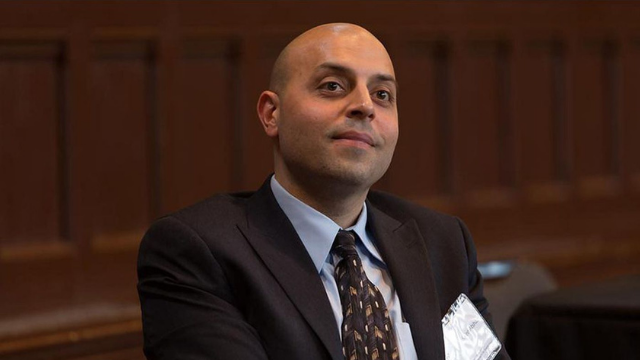
This profile is the third in a series of Q&A articles on Quakers in higher education.
A Palestinian Quaker, a published author, and a thoughtful, deeply compassionate person, Sa’ed Atshan has a doctorate in Anthropology and Middle Eastern Studies from Harvard University. He is an Associate Professor of Peace and Conflict Studies at Swarthmore College and a member of Central Philadelphia Monthly Meeting.
During the 2020-2021 academic year, he is on sabbatical from Swarthmore and is a Visiting Assistant Professor of Anthropology and Senior Research Scholar in Middle Eastern Studies at the University of California, Berkeley. He also previously served as a Postdoctoral Fellow at Brown University’s Watson Institute for International Studies.
Sa’ed’s research is centered on contemporary Palestinian society and politics, global LGBTQ social movements, and Quaker Studies and Christian minorities in the Middle East. Stanford University Press is releasing his forthcoming book titled “Paradoxes of Humanitarianism: The Social Life of Aid in the Palestinian Territories.” He has two previously published books, “The Moral Triangle: Germans, Israelis, Palestinians” (co-authored with Katharina Galor), Duke University Press, and “Queer Palestine and the Empire of Critique,” Stanford University Press.
Sa’ed recently agreed to be one of PYM’s keynote speakers for Annual Sessions 2021.
You have been on Sabbatical this year; how has that been generative to your work and your life as a Quaker?
The pandemic made me realize that I was operating at an unsustainable pace with my work. Being forced to slow down during the lockdown ended up being incredibly important. I have vowed to myself not to return to the previous pace. Previously, Quaker meeting for worship on Sundays provided one of the few spaces in my life where I could pause and recharge with the power of silence. With the slowdown since the pandemic, despite the stress of grappling with global suffering, I have been blessed with more space and time to engage in contemplative and mindful practices.
I am also fortunate to now be on a year-long sabbatical in Berkeley, California. This has made it possible for me to carve out more opportunities for deepening my spiritual groundedness. This spiritual anchoring is enriching my life outlook, and helping me envision my intellectual next steps for when I return to my professorship at Swarthmore this fall.
As a Palestinian Quaker who also identifies as Queer, what do you carry that feels especially grounding when it comes to Faith?
I can feel the spirits of my ancestors, whether Palestinian ancestors like Edward Said, queer ancestors like Audre Lorde, Quaker ancestors like Lucretia Mott, and Quaker queer people of color ancestors like Bayard Rustin. Their examples, and legacies, reverberate in the present, reminding me of the importance of speaking truth from a place of love and with a deep commitment to peace and justice.
March 31st is International Transgender Day of Visibility; what would you have Quaker meetings do to support the trans community?
Thanks for this beautiful question. I stand firmly in solidarity with trans communities here in the U.S. and around the world. There is much that Quaker meetings can do to support their trans kin, from expressing solidarity with trans loved ones in their closest proximity and in their broader communities, respecting preferred pronoun usage, moving beyond the gender binary in our meeting house spaces, donating to organizations that support trans rights, and lobbying elected officials to promote policies that honor the dignity of trans citizens.
Could you tell us more about your work on conflicts and community in your latest book, “The Moral Triangle: Germans, Israelis, Palestinians”? Do you see a parallel in what’s happening in the USA?
I published this book last May with my co-author, Katharina Galor, a German-Israeli professor of Judaic Studies at Brown University. Dr. Galor lost 90% of her family in the Holocaust, and her father survived Auschwitz.
In our book, we explored the Israeli and Palestinian diaspora communities in contemporary Berlin, thinking about Germany’s moral responsibility to these populations, as well as opportunities for restorative justice between Germans, Israelis, and Palestinians. One of our findings was that the German state and society largely extend compassion towards Israelis, which is to be lauded, but that compassion is largely not extended to Palestinians as well, even though, as Edward Said once stated, Palestinians are the victims of the victims and the refugees of the refugees.
Nonetheless, Germany has come a long way in reckoning with its Holocaust past, and the US can learn much from this model, particularly as communities of color struggle for recognition of, and securing reparations for, America’s history of genocide, slavery, and segregation.